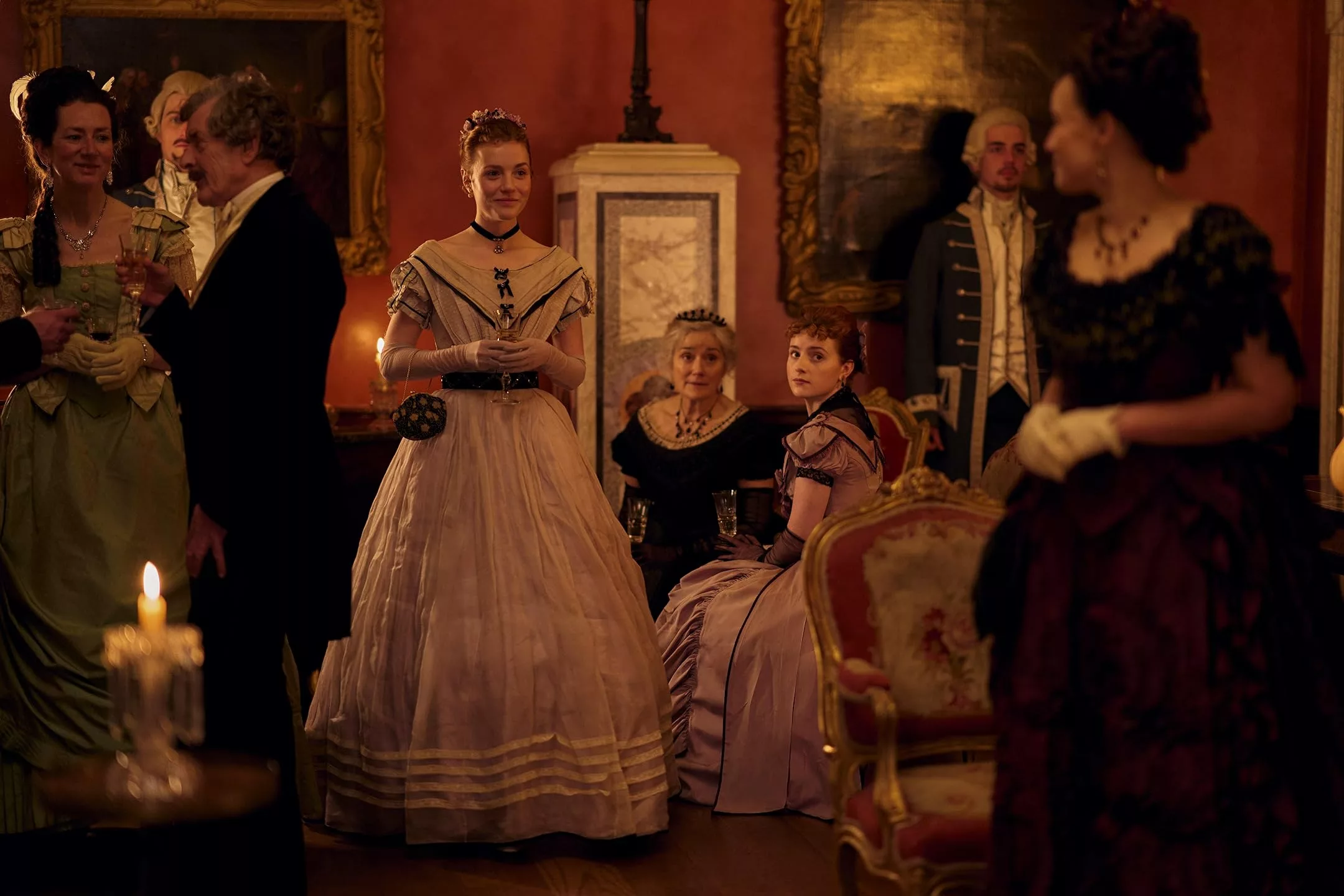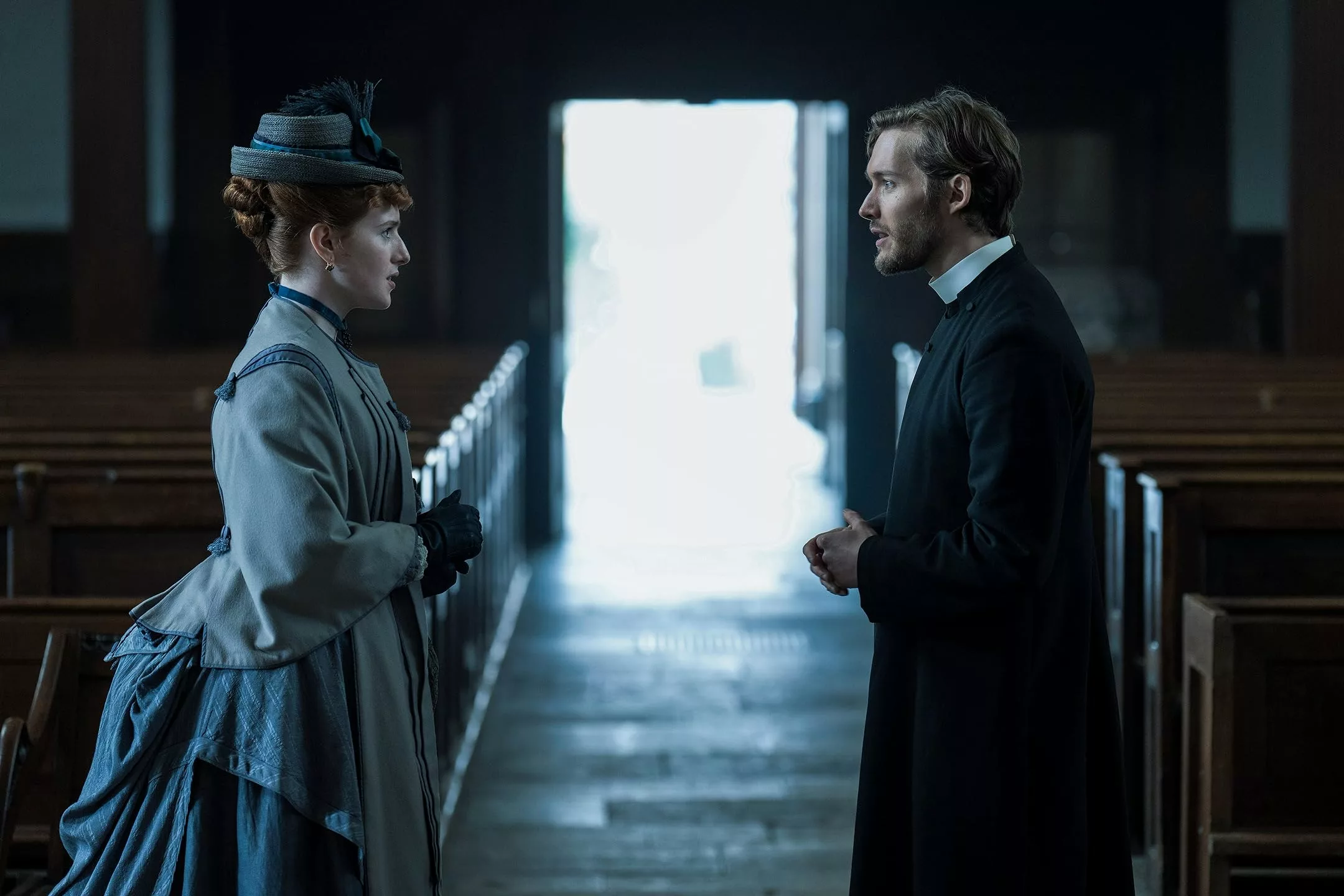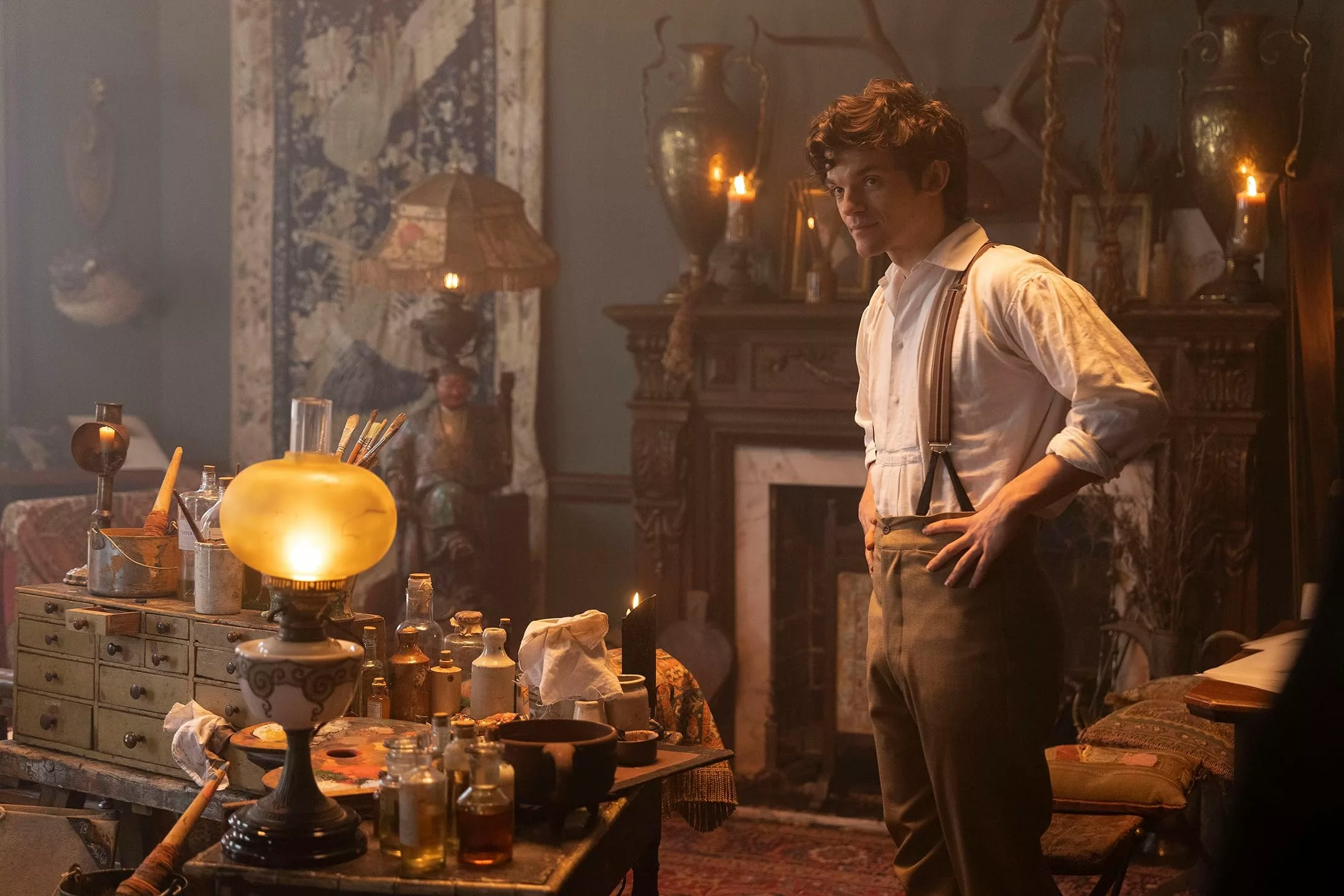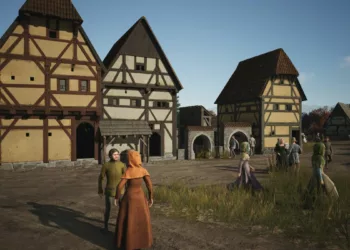Even the most ardent fans of British period dramas have limits to their appetite for manners, mansion houses, and lavish costumes. But creator Julian Fellowes is betting we’ll gladly make room for seconds when he serves up another helping of his signature Downton Abbey-style drama with Belgravia: The Next Chapter.
As devotees know, the first season of Belgravia brought Fellowes’ novel of the same name to life back in 2020. Transporting viewers to 19th century London, it followed the privileged Brockenhurst family and the nouveau riche Trenchards, former merchants rubbing elbows with aristocrats after 25 years of upward mobility. Affairs, illegitimacy, and even Waterloo featured in Fellowes’ soapy mix.
While most limited series wrap up tidy and move on, the ambitious creator is taking us back to Belgravia in the 1870s. Out with the old, in with the “Next Chapter” as he calls it. The ornate sets and empire waist gowns return, but it’s a new generation stepping into the spotlight…and the scandal.
At the broken heart of it all is Lord Frederick Trenchard, grandson of the social climber from season one. Frederick endured cruelty from his father over his illegitimate status. Now mentally scarred, his sudden marriage to Clara Dunn might mend his wounds – or tear the fraying fabric of secrets holding Belgravia’s elite together.
So pour a cup of tea and make room on the chaise lounge. We’re rejoining old friends in Belgravia, where the drama has only just begun.
Revisiting the Tormented Trenchards
Thirty years have passed since we first visited Belgravia, but the secrets, lies, and betrayals binding its inhabitants together remain as tangled as ever. This time, the cameras focus on the technically noble yet deeply troubled Lord Frederick Trenchard, grandson of James Trenchard, the merchant patriarch who legitimized his family’s status last season.
But legitimacy hasn’t eased Frederick’s path. We learn he endured horrific abuse from his father Oliver over his illegitimate birth – the result of his mother’s affair with the manipulative dandy John Bellasis. Convinced the childhood cruelty has made real intimacy impossible, the self-loathing Frederick pins his hopes of redemption on his bubbly new bride Clara Dunn.
Their sudden marriage shocks Belgravia’s upper crust, given Clara’s lack of pedigree and Frederick’s precarious mental state. And as the blushing newlywed soon discovers, behind her husband’s swagger lie demons no antique lace veil can conceal. Frederick oscillates between self-destruction and clinginess, obsessed with risky railroad investments even as he promises Clara the attention she craves.
Matters grow darker when Clara befriends Sophia, wife of Lord Bellasis – none other than Frederick’s true biological father. Ever charming John holds as many secrets as the rest of Belgravia, including one that could unravel the young Trenchards’ already strained union.
Meanwhile, Frederick’s brother James shoulders burdens of his own. A local reverend, he hides his sexuality to preserve not only his post, but his family’s reputation. Yet revealing the truth may be the only way to convince brooding Frederick he’s not the cruel golden child of his imagination.
In Belgravia, sibling rivalry, forbidden desire, financial schemes, and one surprise birth secret intertwine for maximum drama. But will the wounded Frederick and hopeful Clara find common ground before their tenuous marriage meets a tragic Victorian end?
Getting to Know the Troubled Trenchards
As the brooding antihero of Belgravia’s next chapter, Lord Frederick Trenchard is clearly still reeling from the abuse inflicted due to his illegitimate birth. Prone to darkness, fury, and self-loathing, he nonetheless conveys Magneto-esque charisma in his obsessive quest to prove himself through business conquests.
Initially, doe-eyed newlywed Clara seems to calm his storms and offer the unconditional love he craves. But their bond frays as Frederick’s railroad schemes and partnership with an opportunistic French exile consume his focus. “Clara feels oppressed by her husband and trapped in that marriage,” notes producer Gareth Neame, and by all accounts, starts questioning if their future truly lies in the shadow of Trenchard torment.
Clara begins Belgravia as its quintessential ingenue – sheltered, naïve, and brimming with optimism about her shotgun marriage to the damaged Lord Frederick. But as a well-intended outsider, she swiftly discovers good intentions alone cannot penetrate the multi-generational dysfunction of the Trenchards.
Gradually, hints emerge of a steely core beneath Clara’s petal pink exterior. “Desperate to be a part of this world” per the creator, she bears secrets of her own that may hold the key to securing her own future, with or without her husband. Clara remains sympathetic, but may evolve into the chapter’s ultimate survivor.
James spends much of the series off-screen, initially painted by his brother Frederick as the favored golden child whose shadow forever darkened Frederick’s place in the family. But in truth, the local Reverend James leads a life plagued by many of the same repressions defining the Trenchard line. Kindly yet tortured, he secretly grapples with the 19th century’s most forbidden vice – his own homosexuality. Sympathetic listeners soon realize that far from the monster of Frederick’s visions, James may prove one of the few who truly understands his suffering.
An Unexpected Visitor Brings Bombshells
In the simmering cauldron of secrets that is Belgravia, it never takes much for old grudges, forbidden romances, and scandalous revelations to bubble to the surface. This time, the chaos begins with the appearance of an unexpected visitor whose identity remains undisclosed.
Shrouded in mystery, this enigmatic figure has inside knowledge granting them power over several prominent inhabitants of Belgravia’s overlapping social circles. Though their agenda is unknown, preview footage makes two aspects abundantly clear. First, the messenger did not arrive bearing tidings of comfort and joy. And second, they know enough hidden truths to detonate bombshells impacting multiple prominent families.
For all its soapy escapism, much of Belgravia deals with the universal theme of concealment – the small lies and major deceptions considered necessary for keeping up appearances in polite society. This new arrival seems intent on tearing down that elaborate pretense one explosive disclosure at a time.
An unexpected visitor emerges as a truth-teller in this chapter, capable of unraveling several characters’ lives with just a few words. Such a revelation could have immediate effects on the already fragile dynamic between the damaged Frederick and sheltering Clara. But the societal stigma around forbidden sexuality suggests Reverend James also has much to lose if this mysterious figure publicly exposes the secrets he hides behind his clerical collar.
In short, Belgravia’s glossy veneer is once again at risk when someone from the London fog emerges to shine an unwanted spotlight on scandals better left in the shadows of history. But will what they reveal enlighten, endanger, or liberate those forced to confront their demons? Audiences will surely wait with bated breath to discover the impact of truths too inflammatory to remain buried forever, even in a privileged paradise designed precisely for hiding inconvenient realities from view.
Probing the Dark Heart of Belgravia
Belgravia gleams with genteel aesthetics, but its glossy veneer sticks to the surface. Peel back the layers of polite smiles, lavish gowns, and picturesque gas lamps, and The Next Chapter confronts audiences with the darker realities hiding behind Victorian propriety.
Central stands Frederick’s traumatic upbringing, casting shadows still marring his marriage decades later. Through the damaged aristocrat and his strained domestic life, Belgravia confronts the lasting imprint of childhood cruelties – particularly insidious when rooted in society’s limited concepts of legitimacy.
Insecurity and anguish likewise bubble under Belgravia’s placid facade, as both Frederick and his brother James grapple privately with issues considered taboo. The former’s fragile mental state conveys how invisible wounds undermine even the most fortunate. Meanwhile, the Reverend James epitomizes an entire marginalized community forced to repress truth for survival.
Even Clara, the newcomer determined to see the good in Frederick and her new milieu, strains against constraints – emotional, marital, sartorial – as corsets become crushing metaphors. “She feels oppressed…and trapped,” the producer acknowledges, hinting her journey may challenge what women of the era endure by contemporary standards.
Finally, secrets wind all characters tightly in their silken cords, from John Bellasis’ past sins to his estranged son Frederick’s rocky investment schemes. Belgravia argues that in any seemingly perfect system, darkness must be concealed for harmony’s illusion to endure. And sooner or later, the truth will out – from source expected or not.
In holding up the lavish backdrop of 19th century London high society as its glittering mirror, The Next Chapter reflects perils of more modern resonance too. Trauma’s fingerprints across generations. Tortured struggles against a hostile society’s norms. Partners growing distant despite love bonds. The hidden costs of “having it all.” By baring Belgravia’s beautiful wounds, Fellowes makes aristocratic angst accessible as Greek tragedy – and just as timeless.
Belgravia: High Society with a Human Core
With Belgravia: The Next Chapter, Julian Fellowes reaffirms his place as today’s master of sophisticated, yet accessible period television. The society drama possesses all the grand aesthetics fans expect – stunning Victorian architecture, lavish costumes, cleverly indented hierarchies.
Yet for all its production values, Belgravia’s true focus remains intensely emotional stories. In the damaged Lord Frederick and optimistic newlywed Clara, viewers discover nuanced portraits examining how early wounds shape adult relationships and mental health. Supporting characters likewise balance genteel manners with universal experiences of forbidden desire, women’s constraints, and secrets that splinter families internally despite upholding external appearances.
Belgravia argues that human truths persist despite the trappings of class or the passage of eras. Trauma, insecurity, repression, the hope for redemption through love and trust – Fellowes distills these to their essence within his effectively imagined aristocratic sphere.
With Frederick and Clara at its core, The Next Chapter may feature lords and ladies, but presents protagonists fundamentally relatable across backgrounds. Lavish escapism grounded in raw humanity…could any theme better define the singular appeal of a Julian Fellowes series? After two seasons in refined company, the answer must be a decidedly undignified, binge-watching “no.” We can hardly wait to see what commercial and critical splendors this gifted creator conjures up next inside his glittering imagined worlds.
The Review
Belgravia The Next Chapter
With its wounded yet hopeful characters, lavish aesthetic splendor grounded by intricate emotional truths, Belgravia: The Next Chapter may be Julian Fellowes’ most compelling aristocratic creation yet. Belgravia proves period drama can still surprise us, even as Fellowes revisits old themes of society’s crushing effects on personal dreams. Gorgeous trappings aside, he sustains focus on relatable human journeys toward self-realization; his fictional London assembles a memorable cast of troubled yet sympathetic personalities. If borrowing from past successes, the drama’s vision remains fraught with original insights into marriage, family, and self-worth. Sumptuously filmed, deftly performed period piece perfection.
PROS
- Strong performances and characterization
- Gorgeous Victorian aesthetics and costume design
- Intricate plotting exploring complex emotional themes
- Julian Fellowes' sharp writing and social commentary
CONS
- Relies heavily on soap opera-esque dramatic twists
- Can feel cold and aloof at times due to aristocratic milieu
- Romantic storyline borders on melodramatic





























